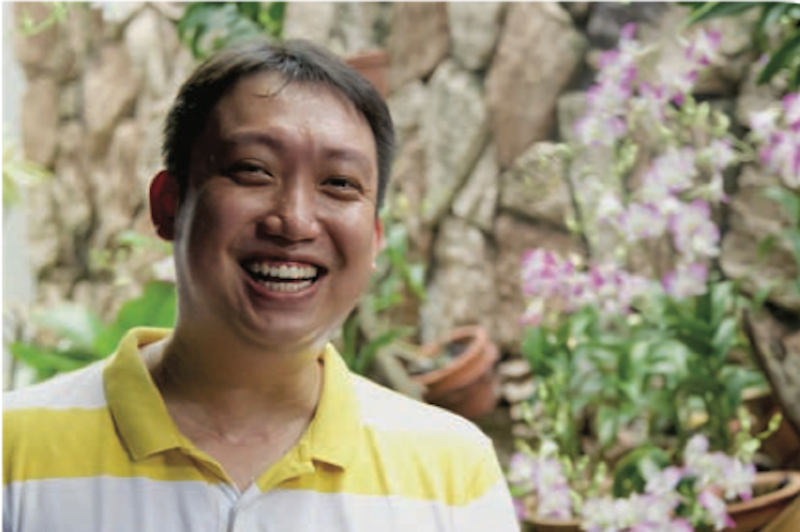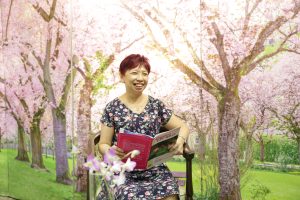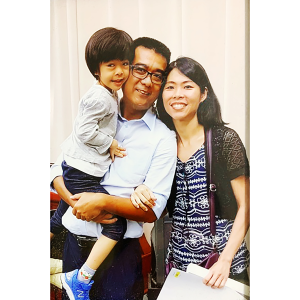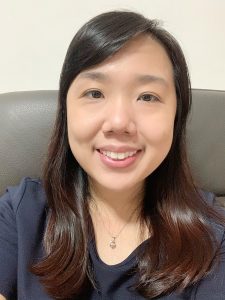
Leow Jian Fu
Young Men Division Leader
I was born a fortune baby (born into a family practising Nichiren Buddhism). However, I only became much active in my own Buddhist practice after much encouragement from many leaders in faith and joining Singapore Soka Association’s (SSA) Student Division (comprising students from tertiary institutions). It was in the Student Division that I began to look beyond myself and think about how I could contribute to the peace of our society. It was also in the Student Division that I came to learn about and appreciate my mentor in life – Soka Gakkai International (SGI) President Ikeda. I wanted very much to communicate and build a closer bond with my mentor. So in 2012, I started writing to President Ikeda once every three months to tell him the various victories, struggles that I had been through and also to share with him the promises and resolutions that I have.
That year was also very memorable to me in another way – I finally found the courage to face squarely a health problem which I had been avoiding for a long time. The right side of the thyroid glands on my neck had been swollen for a couple of years. To manage this condition, I went through various treatments with a combination of Chinese and Western medication, in the hope that it would go away by itself after some time. In fact, all the Western diagnostic examinations from blood test to needle biopsy showed that the lump was benign. And I was convinced that the Chinese medication was slowly reducing the size of my lump. But of course, it didn’t.
Then in 2012, I bumped into an old friend when I was accompanying another friend to the hospital. Almost immediately, she noticed my lump and complained that she had a similar condition. She was also pondering if she should go for an operation. In my desire to encourage this friend of mine, it struck me that it would be hard for me to convince her to go for the operation unless I did the same. And that was how on my next appointment to my doctor, I decided to go for the operation.
Things got off on a rough start however – I was down with a very bad cough and flu just one week prior to admission. This meant that the operation might not be able to proceed which in turn would mean more delay and hassle and possibly more money wasted. Not wanting this, I chanted fervently that my cough and flu would subside before the operation, and I would be able to sleep soundly and safely during the operation so that the doctor could operate on me smoothly. On the day of the operation, my cough subsided in the morning. And after about six hours inside the operation theater, I was finally pushed out to my ward. The operation was a success! Not only that, I was upgraded to a Class B1 ward at no extra cost although I had only applied for the cheapest option of a Class C ward which was what I could afford.
During my three-day stay in the hospital, my parents brought past issues of Creative Life and SSA Times (both reading materials are SSA organ papers) for me to read. Using these publications, I shared Nichiren Buddhism with other patients around me. One memorable sharing was with an elderly man who had amputated one of his legs and was groaning in pain throughout the day. After some hesitation, I managed to pluck up the courage to ask him to chant as I firmly believed that it would help to ease his pain. That night, the elderly man chanted with me in our own beds. With each daimoku that he painstakingly chanted amidst his groaning, I could sense that his pain was easing gradually because slowly, his groaning turned softer and softer until he finally fell asleep soundly. I remembered feeling deep joy and peace welling from within me that night.
One week after the operation, it was time to remove the stitches and do a routine lump examination to find out how successful the operation had been. To my shock and disbelief, however, I was diagnosed with stage two thyroid cancer (follicular thyroid carcinoma).
Cancer? But why? Didn’t all the testing earlier show that the lump was benign? It was really hard to accept that I had cancer and that I need to go for another operation yet again to remove the left side of my thyroid. Even if this operation was successful, I was told that I would need to take thyroxin pills for life to manage my hormone. The side effects might include hair loss, mental or mood changes, tiredness or shortness of breath. It felt like my life was over.
Everything was in a blur afterwards and I really couldn’t remember much what had happened. I could only recall fighting hard to control my tears so that my mother who was beside me would not be affected and somehow my then Young Men Division (YMD) Zone leader came to meet up with me with another friend from the YMD. The three of us went for dinner which tasted bland and the whole time, I didn’t feel like I was present at all nor did I understand how things or people around me could still go on as if nothing had happened. After my leader sent the YMD home, and it was just the two of us left in the car, my tears flowed silently.
Early next morning, he sent me this Gosho passage as an encouragement: “The greater the hardships befalling him, the greater the delight he feels, because of his strong faith. Doesn’t a fire burn more briskly when logs are added? All rivers flow into the sea, but does the sea turn back their waters? The currents of hardship pour into the sea of the Lotus Sutra and rush against its votary. The river is not rejected by the ocean; nor does the votary reject suffering.” (WND-1, 33) I remembered thinking: This is my mission which only I can fulfil.
We launched a daimoku (repeated chanting of the phrase Nam-myoho-renge-kyo) campaign amongst the YMD in our zone to hit 1 million by my operation date. Not only that, I met up with my leader almost every day, paying visits to members in hospital to encourage them to continue to fight against their illnesses. I witnessed how a Women Division (WD) member who was seriously ill was transferred from the Intensive Care Unit (ICU) to a normal ward through our sincere prayers. But I also saw patients who passed on. All these made me realise the importance of our lives. As Nichiren Daishonin states: “Life is the most precious of all treasures. Even one extra day of life is worth more than ten million ryo of gold.” (WND-1, 955) Compare to these people who wished that they had more time in their lives for their family members and friends, I realised how I had wasted times in my life. I resolved to spend it in a more fruitful manner and help more people along the way.With that resolve, I continued to perform Gajokai duties (a security function group comprising YMD members) and home visits to my members in the district and Future Division (comprising students in secondary schools). President Ikeda once gave this guidance: “As Nichiren Daishonin says, ‘Illness gives rise to the resolve to attain the way’ (WND-1, 937). If a practitioner who upholds faith in the Mystic Law becomes ill, it definitely has some profound meaning. It could be said that confronting illness is one route to awakening to the eternity of life. President Toda often said, “A person who has overcome a major illness knows how to deeply savour life.” That was exactly how I felt then amidst my struggle – I was able to savour and appreciate so much more of my own life.During this period, many people held prayer meetings for me to show their support. And I was really grateful to every leader and member who had helped and supported me during this phase of my life. By the time of my operation, we had chanted more than 1 million daimoku in just about one month. On the day before I was admitted, I was feeling so happy at the last prayer meeting that I actually exclaimed: “I’m going to the hospital to do shakubuku!” (sharing the practice of Nichiren Buddhism with others)
After 5 hours in the operating theater, my cancerous thyroid gland was successfully removed and I was again upgraded to a higher class ward. From the day that I was pushed to my ward, I was already able to eat and move around freely, with minimal irritation and pain. It was a great actual proof. After three days in the hospital, I was discharged.
Few months later, I had to go for a radioactive iodine treatment. Before this treatment, the doctor had warned me that I might have to go through this treatment a few more times, depending on the number of cancerous cells that was killed with each dosage. As the medication I was going to drink was a radioactive substance, I might also suffer some possible side effects. On hearing this, I chanted for the highest life condition to face this situation. I also chanted for the medication to be useful, that it would kill the maximum number of cancerous cells with each dosage so that I did not need to constantly visit the hospital for this radioactive iodine treatment. In addition, I also prayed that the medication would leave my body with minimal side effect once it had cleared the cancerous cells. My prayers were all answered! The whole process was very successful, and there was no side effect. Not only that, I merely had to go through this treatment once! On the following checkup, the doctor scanned my whole body and did a blood test which showed that most of the cancerous cells had been killed and my condition was under control. Till today, there is no need for me to drink the radioactive iodine again.
Through these events, one lesson I have learnt is that we should always treasure our health, so that we could create real values in our daily lives. As President Ikeda rightly summarises it: “Buddhism views illness as an opportunity to attain a higher, nobler state of life. It teaches that, instead of agonizing over a serious disease, or despairing of ever overcoming it, we should use illness as a means to build a strong, compassionate self, which in turn will make it possible for us to be truly victorious.”This episode in my life also left me with a deeper appreciation of what President Ikeda had gone through during his younger days. Although he was struggling immensely with tuberculosis, yet, at every single moment of his life, while battling his poor health, President Ikeda continued to encourage others and do his utmost for kosen-rufu (peace and happiness of all people). If not for his earnest efforts, there would have been no SSA nor Nichiren Daishonin’s Buddhism in Singapore. I am really grateful to him because of his guidance and this organisation. Through SSA, I am able to meet many wonderful comrades-in-faith, continue my practice and be able to understand the true philosophy of life. I want to protect this organization and its people because this is the right thing to do in my life. I also want to do more shakubuku because there are many people who had given up hope in their lives when faced with tremendous negativities and obstacles. These people have a right to happiness too. Doing shakubuku would be my way of repaying the debts of gratitude to my mentor. Sensei, please be assured!
(Adapted from the Young Men’s testimony book Hero of the World published in 2017)


